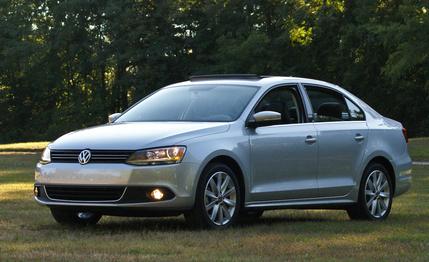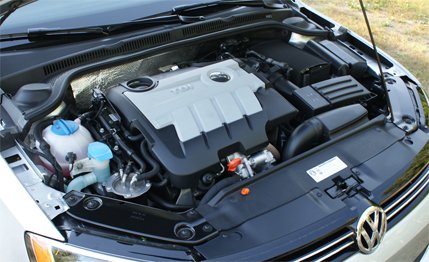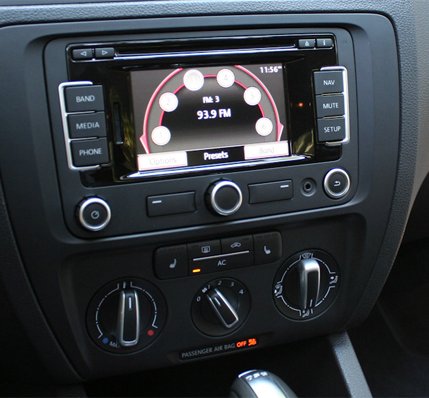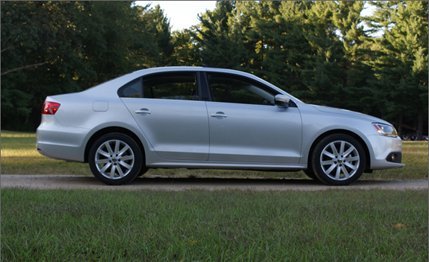 First Drive Review
First Drive Review
Here’s Volkswagen’s American dilemma: Fans like the way the brand’s cars are more expensively engineered than their mainstream rivals, but it’s difficult to shift Jettas in the same quantities as Civics and Corollas when the cars cost more to both VW and the customer. Because the corporate bosses in Wolfsburg, Germany, want the North American arm to sell a lot more cars, quickly—the stated aim being to triple sales by 2018—they’ve forged ahead with a new factory in Chattanooga, Tennessee, and tailored the new Jetta to the U.S. market.
The Jetta made for Americans is bigger and cheaper than the car it replaces. New Jettas are longer overall, which translates to a more spacious interior: In addition to increased shoulder room, rear-seat legroom grows by 2.7 inches. Front-seat legroom remains the same. The Jetta has a larger trunk than the Corolla—15.5 cubic feet compared with 12.3—but it’s actually down half a cube compared to the previous Jetta’s.

The TDI model features the same 2.0-liter turbo-diesel as its predecessor, making 140 hp and a solid 236 lb-ft of torque. We have yet to test the TDI, but it will likely turn in a performance very close to the previous car’s. Expect a 0-to-60-mph time of around 8.3 seconds, with the quarter-mile taking about 16.5. Fuel economy is excellent, with both manual and dual-clutch models earning EPA ratings of 30 mpg city and 42 highway.
As the top-of-the-line Jetta, the TDI comes pretty well loaded. The list of standard equipment includes a sunroof, heated mirrors, Sirius satellite radio, Bluetooth connectivity, and a tilting and telescoping steering wheel. The only upgrades are a nav system—which for $1200 also brings different interior trim, some exterior chrome, fog lamps, and keyless access and starting—and mats for the trunk and floor.
Still, it’s hard to escape the vast tracts of hard plastic inside, which align the Jetta with the shine-happy world of the Corolla and Civic. Fortunately, the dash is logically laid out, with big, legible gauges and easy-to use climate-control and audio systems. The front seats are comfortable and the back row in particular feels roomier than those of its Japanese competitors.

Despite replacing the older car’s multilink rear suspension with a cheaper torsion-beam axle and the electric power steering with a hydraulic system, the new Jetta is still pleasing to drive, although we can’t help thinking that we’d prefer to be behind the wheel of a Mazda 3 or VW’s own Golf. Wind, tire, and engine noise are muted, the ride is well controlled and damped, and the steering builds effort in a nicely linear fashion, even if on-center feel is largely AWOL. Our biggest dynamic complaint is the omnipresent stability control, which rushes in to kill the fun and can’t be switched off. It’s a pity, because the chassis is responsive and nicely balanced.

The TDI engine is impressive, with lots of mid-range torque, and it’s well-matched to the six-speed DSG dual-clutch transmission, which downshifts on demand but likes to upshift early. The manual mode, however, provides fast and satisfying shifts and lets the driver choose forward progress over fuel economy.
The TDI costs $23,765 with a manual transmission, $185 more than the outgoing model, so all that business about cheaper Jettas doesn’t apply to the loaded diesel model. The example we drove, fitted with DSG but without the navigation package, came in at $24,865, hardly a bargain. Unless you’re a mileage junkie or just love the TDI powertrain, we can’t really think of a solid case for the diesel, especially since a similarly equipped Jetta SE with the 2.5-liter five-cylinder costs $22,665. It would be an awful lot of miles before your savings at the pump made up that price difference. And, unlike the previous Jetta TDI, there’s not enough goodness in this new car to make it feel worth its premium.